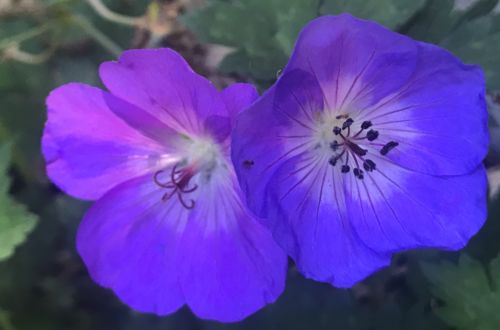
Coronavirus Tidbits #118 2/3/21
Announcements:
First, there is now a Resources Page here for the most commonly asked questions I'm getting.
Happy to continue to answer your questions/concerns as best I can, so don't be shy about that.
News
And now for the bad news. *sigh*
— Kai Kupferschmidt (@kakape) February 1, 2021
It looks like #B117, the more transmissible variant first detected in England, has now picked up the E484K mutation as well. That is the one linked to evading SOME immunity in SAfrica and Brazil.
h/t @_b_meyerhttps://t.co/2iQLr8uJx7
~ ~ ~
Subset of COVID-19 patients have increased bleeding risk
A new potential biomarker raises concerns over the current standard for treating COVID-19 induced blood clots with high dose blood thinners.
Research has found that patients with COVID-19 are prone to serious blood clotting. This is why many patients receive high dose anticoagulants as part of their treatment.
But a new study in Scientific Reports, led by senior author Daniel Lawrence, Ph.D., a Professor of Basic Research in Cardiovascular Medicine at Michigan Medicine, found that aside from this heightened clotting risk, some COVID-19 patients have an unbalanced ability to break down clots as well, which is linked to a potential clinical biomarker seen in later stages of the disease.
This abnormal process of breaking down clots can contribute to a high bleeding risk, raising concerns about the current practice of giving COVID-19 patients high dose anticoagulants throughout the duration of their disease course.
This finding may be consistent with the NIH's recent decision to pause enrollment of critically ill COVID-19 patients in the Antithrombotic Therapy to Ameliorate Complications of COVID-19 (ATTACC) trial, because "a potential for harm in this sub-group could not be excluded."
https://www.eurekalert.org/pub_releases/2021-02/mm-u-soc020121.php
~ ~ ~
New diabetes cases linked to covid-19
Researchers don’t understand exactly how the disease might trigger Type 1 or Type 2 diabetes, or whether the cases are temporary or permanent. But 14 percent of those with severe covid-19 developed a form of the disorder, one analysis found.
https://www.washingtonpost.com/health/2021/02/01/covid-new-onset-diabetes/
~ ~ ~
Amazon spreads vaccine misinformation, iSchool researchers find
UNIVERSITY OF WASHINGTON
Amazon's search algorithm gives preferential treatment to books that promote false claims about vaccines, according to research by UW Information School Ph.D. student Prerna Juneja and Assistant Professor Tanu Mitra.
Meanwhile, books that debunk health misinformation appear lower in Amazon's search results, where they are less likely to be seen, the researchers wrote in a paper that was recently accepted to CHI, the top annual conference on human-computer interaction.
In their paper, Juneja and Mitra noted that Amazon has faced criticism for not regulating health-related products on its platform. They conducted audits to determine how much health misinformation is present in Amazon's recommendations and how the personalization of its search results affects the amount of misinformation users receive.
The researchers tested a list of 48 search terms on vaccine-related topics, such as "immunization" and "MMR vaccine and autism" over a 22-day period and found that products promoting misinformation consistently outperformed those that debunk false claims. Misinformative products performed especially well when results were sorted by certain filters -- "average customer reviews" and "price low to high."
https://www.eurekalert.org/pub_releases/2021-02/uow-asv020221.php
Diagnostics:
still an incredible, negligent lack of accurate, rapid testing.
U.S. Cuts $231 Million Deal To Provide 15-Minute COVID-19 At-Home Tests Without A Prescription https://t.co/9Dnh4bbTYV
— Ruth Ann Crystal, MD (@CatchTheBaby) February 1, 2021
US Defense Dept, will help fund construction of Ellume's first manufacturing plant in the US which will produce more than 500,000 tests per day. pic.twitter.com/Bppk09Zulg
Ellume COVID-19 Home Test correctly identified 96% of positive samples and 100% of negative samples in individuals with symptoms. In people without symptoms, the test correctly identified 91% of positive samples and 96% of negative samples.
~ ~ ~
And on the importance of funding basic science:
Without the discovery of Yellowstone's heat-resistant bacteria more than half a century ago, the technique used in most of the available tests for COVID-19 wouldn't be possible https://t.co/lMS698dCmc
— National Geographic (@NatGeo) February 2, 2021
Drugs and Vaccines:
Sputnik V Vaccine's Effectiveness
The Gamaleya National Research Center of Epidemiology and Microbiology of the Ministry of Health of the Russian Federation and the Russian Direct Investment Fund announced on February 2, 2021, that The Lancet medical journal published interim results of a Phase III clinical trial of Sputnik V, confirming the vaccine's high efficacy and safety.
According to the peer-reviewed study's results, the Sputnik V vaccine provided full protection against severe cases of the novel coronavirus infection. It generated a robust humoral and cell-mediated immune response.
In the interim efficacy analysis of the randomized, double-blind, placebo-controlled clinical trial, where data on 19,866 volunteers were included in the efficacy analysis, the two-dose treatment of Sputnik V administered 21 days apart demonstrated efficacy of 91.6% against COVID-19. The calculation is based on the analysis of 78 confirmed cases of COVID-19 identified in the placebo group (62 cases) and the vaccine group (16 cases).
The Sputnik V vaccine is based on a well-studied human adenoviral vectors platform.
https://www.
~ ~ ~
Tunisia, Palestinians among first COVAX vaccine recipients
The WHO set up COVAX along with the GAVI vaccine alliance to ensure equitable access to COVID-19 vaccinations globally.
CAIRO--The Palestinian territories and Tunisia will benefit from a first wave of coronavirus vaccines from the COVAX scheme, but poorer states in the Middle East face a big gap in early vaccine provision, a World Health Organization (WHO) official said on Monday.
The Palestinian territories are expected to receive 37,000 doses of the COVID-19 vaccine made by Pfizer and BioNTech starting in mid-February through COVAX, while Tunisia is due to receive 93,600 doses,
However, there was a “very significant gap” between the planned vaccine rollout in wealthy countries and those that are lower-income or affected by conflict...The WHO’s Eastern Mediterranean region includes Afghanistan, Pakistan, Somalia and Djibouti, as well as Middle Eastern states.
https://thearabweekly.com/tunisia-palestinians-among-first-covax-vaccine-recipients
~ ~ ~
A third of Americans say they are unlikely or hesitant to get COVID-19 vaccine
UC Davis nationwide survey
with 14.8 percent of respondents being unlikely to get vaccinated and another 23 percent unsure...vaccine safety and effectiveness assessments as the primary basis for hesitancy
https://www.eurekalert.org/
~ ~ ~
Remdesivir disrupts COVID-19 virus better than other similar drugs
It works by disrupting SARS-CoV-2's RNA polymerase, a key enzyme that the virus needs to replicate itself. When this enzyme is disrupted, the virus cannot multiply and spread within the body.
https://www.eurekalert.org/pub_releases/2021-01/uoc-rdc012921.php
~ ~ ~
How vitamins, steroids and potential antivirals might affect SARS-CoV-2
Evidence is emerging that vitamin D - and possibly vitamins K and A - might help combat COVID-19. A new study from the University of Bristol published in the journal of the German Chemical Society Angewandte Chemie has shown how they - and other antiviral drugs - might work. The research indicates that these dietary supplements and compounds could bind to the viral spike protein and so might reduce SARS-CoV-2 infectivity. In contrast, cholesterol may increase infectivity, which could explain why having high cholesterol is considered a risk factor for serious disease.
https://www.eurekalert.org/pub_releases/2021-01/uob-hvs012921.php
~ ~ ~
Myths of Vaccine Manufacturing
Science Translational Medicine By Derek Lowe 2 February, 2021
In the last few days, the question of why more drug companies haven’t been enlisted for vaccine production has come up. It’s mostly due to this tweet:
The problem is, as far as I can see, this is simply wrong. There are not “dozens of other pharma companies” who “stand ready” to produce these mRNA vaccines. To me, this betrays a lack of knowledge about what these vaccines are and how they’re produced. Even though I’m not a pharma manufacturing person, I am indeed a pharma researcher in general. So I would be glad to fill in this gap, and here’s why it’s not possible to suddenly unleash dozens of companies to crank out the Pfizer/BioNTech and Moderna vaccines.
The first thing to understand is that these are not, of course, traditional vaccines. That’s why they came on so quickly. mRNA as a vaccine technology has been worked on for some twenty to twenty-five years now, from what I can see, and (as I never tire of mentioning) we’re very fortunate that it had worked out (and quite recently) several of its outstanding problems just before this pandemic hit. Five years ago we simply could not have gone from sequence to vaccine inside of a year. And I mean that “we” to mean both “we the biopharma industry” and “we the human race”.
At this point, let me briefly dispose of an even less well-founded take that’s been going around as well. I’ve seen a number of people say something like “We had the vaccine back in February! It only took until the end of the year to roll it out because of the FDA!” The main thing I’ll say about that idea is that no one who actually works on vaccines, in any capacity, has any time for that statement. Not all vaccine ideas work – we’re already seeing that with the current coronavirus, and if you’d like to talk to some folks about that, then I suggest you call up GlaxoSmithKline and Sanofi and ask them what happened to their initial candidate, and while you’re at it, call up Merck and ask them what happened to their two. Note that I have just named three of the largest, most experienced drug companies on the planet, all of whom have come up short. So no, we did not “have the vaccine” in February.
One of the other reasons we didn’t have it back then is the whole problem of figuring out how to make the stuff, and that brings us back to today’s discussion. How do you make the Moderna and Pfizer/BioNTech vaccines? And what’s stopping “dozens of other pharma companies” from doing the same? Let’s get into those details, stopping briefly again to imagine asking James Hamblin above to actually start naming “dozens” of pharma companies. Anyone have a good over/under on how many names would get rattled off?
https://blogs.sciencemag.org/pipeline/archives/2021/02/02/myths-of-vaccine-manufacturing?utm_source=
~ ~ ~
Getting a Covid vaccine appointment is described as a clusterf**k experience by many. Rules vary by county and if you are not computer savvy, you are out of luck.
The wind chill factor here in Dartmouth MA is Minus 11. Minus 11 is also the IQ of the coders who designed the MA government’s online vaccine appointment system.
— Tom Peters (@tom_peters) January 29, 2021
Devices:
Epidemiology/Infection control:
Some updated comparisons with countries with large populations (>20M) pic.twitter.com/yp8cCa1auq
— Eric Topol (@EricTopol) February 1, 2021
~ ~ ~
https://twitter.com/brownandbella/status/1355619033048096769?s=20
~ ~ ~
Wow, this tweet picked up a lot of attention.
— Sven the Antifa Cat (@SvenAntifaCat) January 30, 2021
For those that are thinking this is an isolated issue for BH, keep in mind that BIPOC workers commute from other parts of LA to service the rich and entitled.
This is risking the lives of the workers families and communities.
~ ~ ~
"The U.S. has suffered more deaths from COVID-19 than it did in all of World War 2. Taiwan has suffered a total 7." https://t.co/ou8eCQRU8S
— ryan cooper (@ryanlcooper) January 31, 2021
~ ~ ~
Age groups that sustain resurging COVID-19 epidemics in the US
By late summer 2020, the resurgence of COVID-19 in the United States was largely driven by adults between the ages of 20 and 49, a new study finds. The results indicate that in locations where novel highly transmissible SARS-CoV-2 lineages have not yet established, additional interventions among adults of these ages could bring resurgent COVID-19 epidemics under control and avert deaths. Following initial declines in the number of reported SARS-CoV-2 infections and deaths - a result largely attributed to non-pharmaceutical interventions - a resurgence in transmission of COVID-19 occurred in the United States and Europe beginning in August 2020. Understanding the age demographics that drove this is crucial. -- AAAS
https://www.eurekalert.org/pub_releases/2021-02/aaft-agt020221.php
Tips, general reading for public:
StayAtHome
Wash your hands.
Rinse and repeat.
Politics:
Anti-vax protests, organized on Facebook...
The $26,000 fine imposed on a Sask. nurse for a Facebook post has been overturned. Carolyn Strom did not commit professional misconduct by complaining about her grandfather's care, court rules, by @MeLaura https://t.co/sVjR4wA7F3 via @cbcnews #LTC #cdnhealth #nursing
— André Picard (@picardonhealth) February 2, 2021
i’d encourage you all to remember that HARVEY MILK was killed by another legislator not a random fringe extremist.
— Max Crumm (@MaxCrumm) January 28, 2021
Big Mac in the US: $5.66
— Lukas Clark-Memler (@lclarkmemler) January 30, 2021
Big Mac in Denmark: $4.90
Arguments against raising wages aren't based on economics but a deep disdain for the working class.
Source: Big Mac Index January 2021 https://t.co/1DxG3urVSj https://t.co/BTt0qhMuP5
Feel good du jour:
“Don't underestimate the value of Doing Nothing, of just going along, listening to all the things you can't hear, and not bothering.” - A.A. Milne #SaturdayVibes pic.twitter.com/hqPTqBSI6M
— Forest Service NW (@ForestServiceNW) January 30, 2021
~ ~ ~
https://twitter.com/erinruberry/status/1355991040210194437?s=20
~ ~ ~
You may like this little guy too, one of my favorites: https://t.co/3nwhAb3eUn
— Places of Repose (@PlacesRepose) February 1, 2021
~ ~ ~
4yo in Virginia today went outside to play then came back to the front door with a new friend
— Ruth Ann Crystal, MD (@CatchTheBaby) February 2, 2021
(photo credit: u/SeenSomeThangs) pic.twitter.com/1lClkOVkAN
Comic relief:
Perspective/Poem
Inspiring story about @LaurentDTardif. Great respect for his decision. His team is going to the Super Bowl. He’s staying on the coronavirus front lines. https://t.co/oCGOZ3fIea
— Judy Stone (@DrJudyStone) February 1, 2021
~ ~ ~
"AP: Have you gotten your shot?
— Jen Kates (@jenkatesdc) February 3, 2021
Parton: No. I’m not going to get mine until some more people get theirs. I don’t want it to look like I’m jumping the line just because I donated money."@DollyParton https://t.co/L04250sM11 pic.twitter.com/ttydkhUEQl
Bits of beauty:






